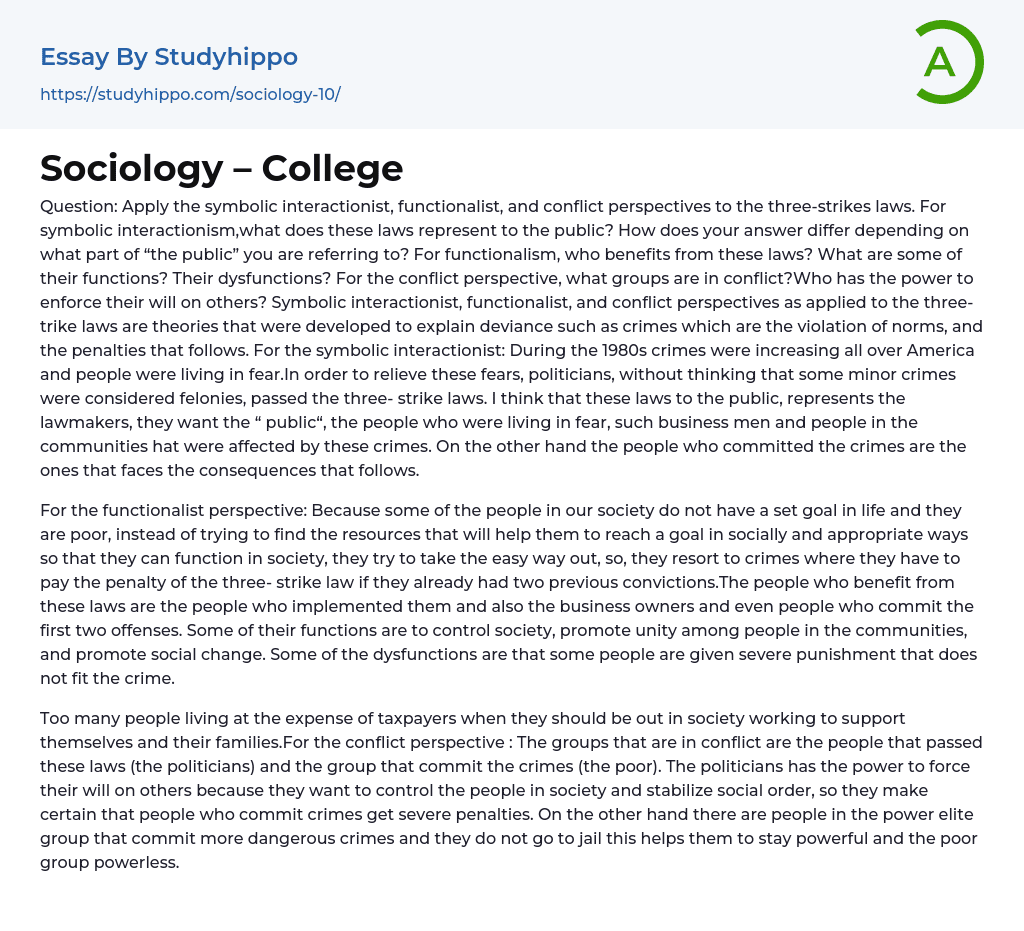The application of symbolic interactionist, functionalist, and conflict perspectives on three-strikes laws involves theories that aim to explain crimes, which are the violation of norms, and their respective penalties. The symbolic interactionist perspective highlights how three-strikes laws represent lawmakers' desire to alleviate public fear and anxiety regarding crime during the 1980s. However, the perception of these laws varies among different segments of the public depending on their experiences and exposure to crime. The functionalist perspective examines the benefits and functions of these laws, identifying those who benefit from their implementation along with associated dysfunctions. The conflict perspective, on the other hand, identifies conflicts among groups and analyzes who holds the power to enforce their will on others concerning these laws. Ultimately, the individuals who commit crimes face the consequences that follow under t
...hree-strikes laws while politicians aim to ease public fear for certain segments of society such as businessmen or impacted community members.
From a functionalist perspective, individuals who lack direction and financial resources may turn to crime instead of seeking out socially appropriate means to improve their lives. This can result in repeated offenses leading to harsh penalties under the three-strike law. While those who benefit from these laws may include those who implemented them, business owners, and even those who committed lesser crimes, their function is to control society, promote community unity, and drive social change. However, a dysfunction of this system may be the punishment of individuals with penalties that do not fit the severity of their crimes.
The text argues that too many individuals are supported by taxpayer money instead of being self-sufficient by working and supporting their families. This perspective
is analyzed through the conflict theory, which emphasizes the conflict between two groups: politicians who created laws and those who commit crimes, specifically the impoverished. The politicians hold power and enforce strict penalties for criminals to maintain social order. In contrast, members of the power elite commit more severe crimes and avoid punishment, which solidifies their control while keeping the poor powerless.
- Professor essays
- Should College be Free essays
- Should college athletes be paid essays
- College Education essays
- College Tuition essays
- Graduation essays
- College Goals essays
- Personal Statement essays
- Online Classes Vs Traditional Classes essays
- Online Education essays
- Student Loan essays
- Study Abroad Scholarship essays
- Reasons To Go To College essays
- Paying College Athletes essays
- Technology In The Classroom essays
- Criminal Justice System essays
- Classroom essays
- College essays
- E-Learning essays
- Elementary School essays
- Examination essays
- Graduate School essays
- High School essays
- History Of Education essays
- Homeschooling essays
- Kindergarten essays
- Middle School essays
- Public School essays
- School essays
- Single Sex Schools essays
- Special Education essays
- Student essays
- Teacher essays
- University essays
- Vocational Education essays
- Animal Cruelty essays
- Charles Manson essays
- Crime Prevention essays
- Crime scene essays
- Criminal Justice essays
- Criminology essays
- Cyber Crime essays
- Damages essays
- Detention essays
- Distracted Driving essays
- Drug Trafficking essays
- Drunk Driving essays
- Forensic Science essays
- Gang essays
- Hate Crime essays




